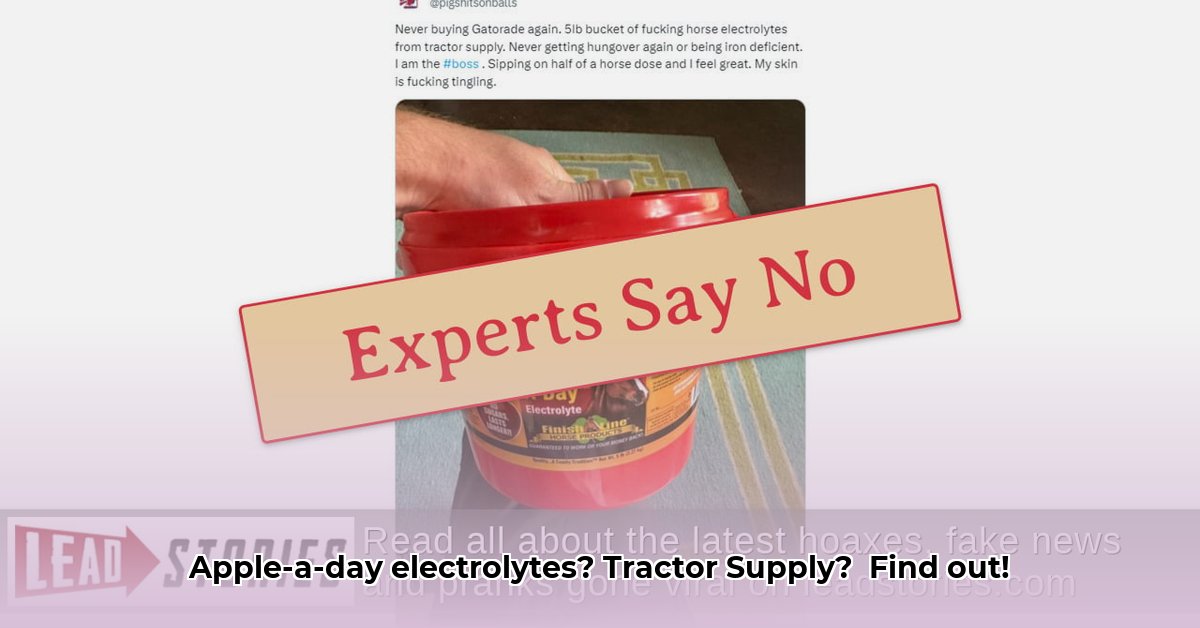
Apple-a-Day Electrolytes: Tractor Supply and the Human Health Risk
A concerning trend has emerged: individuals are consuming Apple-a-Day equine electrolytes, a product readily available at Tractor Supply, intended for horses. This practice poses significant health risks. Why? Because equine electrolytes contain mineral concentrations far exceeding human needs, potentially leading to severe health consequences. Similar concerns exist regarding other animal products, like those discussed on this page.
Understanding the Product: Designed for Horses, Not Humans
Apple-a-Day electrolytes, manufactured by Finish Line Horse Products and sold at Tractor Supply, are formulated to replenish vital minerals and fluids in horses. The crucial difference lies in dosage: the high concentration of minerals suitable for a large animal like a horse is potentially dangerous for humans. While Tractor Supply’s role is simply retail, the potential health consequences necessitate attention.
The Perils of Misuse: Serious Health Risks
Consuming Apple-a-Day electrolytes designed for horses can lead to serious health problems. The excessive mineral content disrupts the delicate electrolyte balance in humans. Dr. Sarah Chen, MD, a cardiologist at the University of California, San Francisco, explains, "Electrolyte imbalances can cause a range of issues, from mild digestive upset to severe cardiac arrhythmias (irregular heartbeats), potentially even life-threatening conditions." The lack of FDA approval for human consumption further underscores the significant risks.
But aren’t there positive testimonials online? While some anecdotal reports exist, these lack scientific backing. Dr. Emily Carter, RD, a registered dietitian at Stanford Health Care, cautions, "Anecdotal evidence isn't reliable. Equine electrolytes are not intended for human consumption. There’s no scientific evidence to support their use in humans, and their high mineral content exposes individuals to significant risks."
Regulatory Gaps: A Need for Clarity and Action
Current regulations appear inadequate. The labeling on many animal supplements might not clearly communicate the dangers of human consumption, contributing to the misuse. This points to systemic flaws that require immediate attention.
Fixing the Problem: A Multi-pronged Approach
Addressing this issue requires collaborative efforts:
Finish Line Horse Products: Implement significantly clearer labeling, explicitly stating that the product is not for human consumption, and explore legal avenues to further mitigate liability for misuse.
The FDA: Re-evaluate regulations surrounding animal supplement labeling to ensure better consumer protection; enhance online monitoring to detect and address misuses; and consider stricter regulations to prevent such practices and launch public awareness campaigns.
Healthcare Professionals: Educate patients about the dangers of using animal supplements and emphasize the importance of consulting a doctor before using any supplement.
Consumers: Exercise extreme caution. Never use animal products intended for animals. Consult a healthcare professional for any supplement-related questions.
The Risks, Quantified
The overall risk associated with consuming Apple-a-Day equine electrolytes is considered extremely high, due to significant potential for harm and serious consequences.
How to Safely Consume Electrolytes? (Choose Human-Formulated Options)
Key Takeaways:
- Equine electrolytes, formulated for vastly different physiological needs, are not suitable for human consumption.
- High mineral concentrations pose serious risks of electrolyte imbalances and potential organ damage.
- The absence of FDA approval signals a significant lack of safety testing for human use.
- Anecdotal evidence should not outweigh scientific consensus regarding the dangers of misuse.
- Always consult a healthcare professional before using any supplement.
Choosing safe and appropriate electrolytes for human consumption is of utmost importance. Remember, your health is worth protecting. Avoid the allure of potentially dangerous shortcuts.